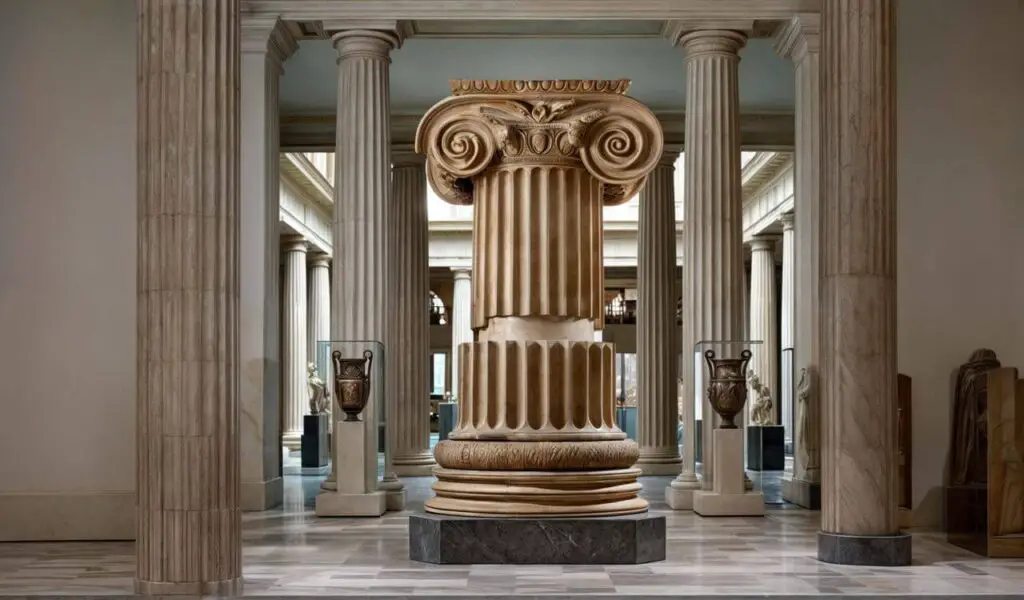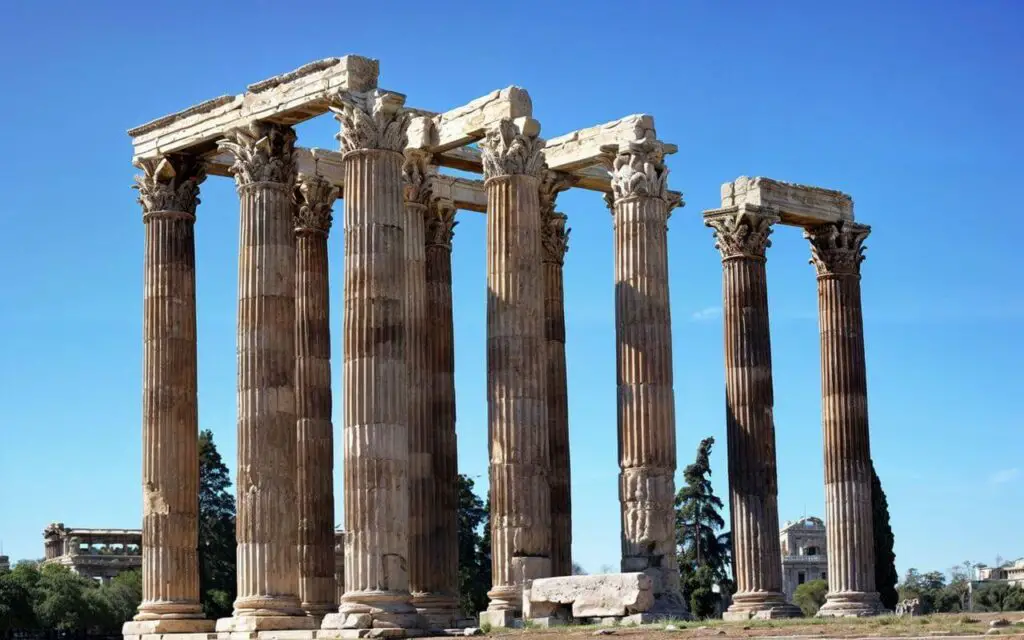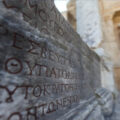The Greek alphabet stands as a monumental pillar in the evolution of written language, tracing its roots back to the 9th century BC. It not only shaped the course of Greek literature but also had a profound impact on the development of other alphabets around the globe. Among its letters, one symbol, in particular, captures the essence of simplicity and complexity alike: the letter “I” in Greek, known as “iota.” This diminutive letter holds a wealth of significance, far surpassing its modest appearance on the page.
Iota’s influence stretches across various fields, making notable appearances in mathematics and science, where precision and clarity are paramount. It’s a testament to the Greek alphabet’s enduring legacy that these ancient symbols continue to play a critical role in contemporary academic and scientific discourse. But iota’s relevance is not confined to the academic realm; it embodies a rich tapestry of cultural and symbolic meanings that have evolved over millennia.
This article aims to unravel the mysteries surrounding iota, delving into its historical roots, phonetic significance, and cultural impact. By exploring this single letter, we embark on a broader exploration of the Greek alphabet’s legacy. From its ancient origins to its modern-day applications in various fields, iota serves as a fascinating entry point into the world of Greek letters and symbols, offering insights into the interplay between language, culture, and knowledge throughout history.
Historical Context of the Greek Alphabet
The Greek alphabet, a cornerstone of linguistic heritage, emerged around the 9th century BC, marking a pivotal transition from the Phoenician script. This adaptation did not merely introduce a new set of symbols; it represented a significant evolution in the way language and, by extension, human thought was recorded and communicated. The Greeks modified the Phoenician alphabet, which primarily consisted of consonants, by introducing vowels. This innovation greatly enhanced the expressive capacity of the written word, enabling more accurate representations of speech sounds.
Among these symbols, ancient Greek letters laid the foundation for the Greek letters and symbols we recognize today. Their introduction facilitated the development of literature, philosophy, and science, contributing to the rich intellectual tradition of ancient Greece. The legacy of these letters extends beyond their historical and linguistic significance, as they have been woven into the fabric of modern languages. The transition of Greek letters into the English alphabet and other languages is a testament to their enduring influence.
The letter “I” in Greek, or iota, epitomizes this enduring legacy. Originally derived from the Phoenician letter yodh, iota underwent its own evolution from ancient to modern Greek. In its earliest forms, it represented a simple ‘i’ sound, similar to the ‘i’ in “machine.” Over time, the representation and usage of iota in the Greek language have mirrored the linguistic shifts and cultural changes within Greek society.
As we trace the path of the Greek alphabet i, from its ancient Greek letters to its current form, we uncover a narrative that is intertwined with the development of Greek civilization itself. The evolution of iota, from a symbol on a clay tablet to its use in contemporary Greek and its adoption in scientific and mathematical notation, offers a unique lens through which to view the history and impact of the Greek alphabet. This story is not just about the transformation of a letter but about the dynamic relationship between language, culture, and knowledge across centuries.
The Letter Iota: A Closer Look

At the heart of the Greek alphabet lies iota, the ninth letter, symbolizing far more than its diminutive size might suggest. Known as i in Greek letters and represented by the symbol ι, iota is fundamental not only to the structure of the Greek language but also to the heritage and identity that language carries. In its essence, iota encapsulates the elegance and precision of Greek linguistic tradition.
The pronunciation of iota has been consistent over centuries, embodying the Greek letters with pronunciation that align closely with their original sounds. This consistency is crucial, given the role of Greek in the liturgical and scholarly traditions of the Western world. Iota sounds like the ‘ee’ in “see,” a pure and elongated vowel sound that is distinctive in its clarity. This phonetic significance underscores the importance of pronunciation in understanding and preserving the legacy of Greek letters.
Beyond its phonetic role, the appearance of iota in ancient manuscripts offers a glimpse into the rich history of Greek textual tradition. From the earliest papyrus scrolls to the meticulously illustrated manuscripts of the Byzantine era, iota has been a constant, its simple stroke often adorned with the elaborate artistic flourishes characteristic of Greek scribe work. This visual evolution from a straightforward symbol to an ornate letter in manuscripts reflects the broader cultural and artistic developments within Greek society.
The inquiry into what is i in Greek leads to a deeper appreciation for the nuances of the Greek symbol for i. Iota’s simplicity belies its significance in the formation of diphthongs and its role in differentiating words that would otherwise be homophones. Its utility in the language demonstrates the Greeks’ thoughtful approach to linguistic expression, emphasizing both sound and meaning.
This detailed examination of iota in the Greek alphabet reveals its pivotal role not only as a letter but as a symbol of the linguistic ingenuity of the Greeks. The journey from Greek letters for i to understanding iota’s integral position in the alphabet is a testament to the depth and complexity of Greek linguistic heritage. The letter iota, therefore, stands as a symbol of the precision, beauty, and enduring legacy of the Greek language.
Iota in Mathematics and Science
The Greek alphabet’s influence extends far beyond its immediate linguistic context, playing a pivotal role in the realms of mathematics and science. Here, the precision and clarity afforded by Greek letters, including iota, are invaluable. Their use in these fields is not merely a tradition but a testament to the Greek alphabet’s capacity for conveying complex concepts with elegance and efficiency.
Greek letters, such as iota, have been embedded into the very fabric of mathematical and scientific notation. Iota itself, though seemingly modest, finds its place in various formulas and theories, symbolizing elements, principles, or constants with its singular presence. This practice of using Greek letters in math and science underscores the universality and timelessness of these symbols, bridging ancient language and modern inquiry.
The significance of Greek letters in mathematical and scientific notations cannot be overstated. They provide a shorthand that is both compact and rich with historical resonance. For instance, in mathematics, iota is often used to denote an imaginary unit, fundamental in the field of complex numbers. This application is just one example of how the adoption of Greek letters for math facilitates clear and concise communication among scholars and researchers.
Moreover, iota’s use in scientific theories and formulas extends its influence from abstract mathematics to the empirical sciences. Here, Greek letters serve as a universal language, enabling scholars from diverse linguistic backgrounds to engage with complex concepts without the barriers posed by traditional language. This universality not only fosters collaboration but also enhances the precision of scientific communication.
The iota symbol in maths and science exemplifies the broader utility of Greek letters in these disciplines. Their application is a tribute to the enduring legacy of Greek thought, reflecting an intellectual lineage that connects the philosophical inquiries of ancient Greece with the cutting-edge discoveries of modern science. Through iota and its counterparts, the Greek alphabet continues to be a bridge between the past and the present, facilitating the exchange of ideas across cultures and epochs.
Iota’s Cultural and Symbolic Significance

The letter iota, while small in stature, carries a profound cultural and symbolic weight that permeates various aspects of Greek heritage and beyond. Its presence in Greek mythology, literature, and everyday language speaks to a broader narrative about the power of language and symbols in shaping human experience and expression.
In cultural expressions and symbols, iota stands out not just as a letter but as a marker of significant concepts and values. Its mention in proverbs and philosophical texts often symbolizes minimalism or the importance of small beginnings, echoing the adage that “great things start from small beginnings.” This symbolism is deeply rooted in the Greek ethos, reflecting a worldview that appreciates the significance of detail and the potential inherent in the seemingly insignificant.
The philosophical implications of iota are particularly evident in discussions about language and meaning. It has been used to illustrate the importance of precision in language, where a slight change can dramatically alter meaning. This sensitivity to nuance is a testament to the Greek tradition of rhetorical and philosophical inquiry, where iota could represent the difference between truth and falsehood, or essence and appearance.
Engaging stories and myths involving iota further illustrate its impact on Greek culture. For example, the term “not one iota” has become synonymous with the idea of no small difference being too trivial to ignore, originating from debates on theological doctrines where the presence or absence of an iota in a word could denote significantly different interpretations. This expression underscores how iota has transcended its literal meaning to become a symbol of precision and critical distinction in broader cultural contexts.
Iota’s significance is further magnified when considering its role in names and terminologies derived from Greek mythology and history. It appears in the names of deities, heroes, and philosophical concepts, serving as a linguistic thread that connects modern language to ancient narratives and ideals.
In summary, the cultural and symbolic significance of iota within the Greek alphabet extends far beyond its physical representation. It embodies a rich tapestry of meanings and values, from the philosophical to the everyday, reflecting the depth of Greek cultural heritage. Through iota, we gain insight into the nuanced ways in which language and symbols can influence thought, culture, and identity across time and space.
Iota’s Spiritual and Mystical Significance
The spiritual and mystical significance of iota (ι) within various religious and mystical traditions illustrates the profound depth and breadth of this simple Greek letter’s influence. As a symbol, iota embodies concepts that reach far beyond its physical form, touching on the divine, the universe, and the essence of existence itself.
In ancient rituals and spiritual texts, iota is often found to represent unity, singularity, and the indivisible nature of the divine. This symbolism is rooted in the letter’s simplicity and its position within the Greek alphabet, where it serves as a fundamental building block, much like the concept of oneness in many spiritual traditions. The use of iota in religious manuscripts and sacred texts further underscores its association with profound spiritual meanings, highlighting its role as a conduit between the human and the divine.
The mystical interpretations of iota delve into numerology and the symbolic representation of numbers in Greek thought. Here, iota is not just a letter but a symbol laden with esoteric meanings, often associated with the number one and thus with notions of beginning, unity, and the source of all things. This numerical association enriches iota’s spiritual significance, linking it to concepts of creation, origin, and the fundamental nature of reality.
In the context of Greek numerology, iota’s value and implications are contemplated with reverence. It is seen as embodying the essence of all potential, the starting point from which all multiplicity and complexity arise. This interpretation aligns with the mystical belief in the power of beginnings and the potential inherent in the primordial.
Moreover, iota’s influence on modern spiritual practices reveals the timeless nature of its symbolic meanings. Across various spiritual traditions, iota is recognized for its representation of key spiritual concepts, such as the indivisible soul, the eternal divine, or the singularity of consciousness. These interpretations demonstrate how the symbolic meanings of iota have transcended their ancient origins to resonate with contemporary seekers of wisdom and spiritual understanding.
Through its spiritual and mystical significance, iota (ι) invites reflection on the interconnectedness of language, symbolism, and the human quest for meaning. It stands as a testament to the enduring power of symbols to convey deep spiritual truths and to bridge the gap between the tangible and the intangible, the known and the unknowable.
Iota Beyond Greece: Influence on Other Languages and Fields
The influence of the Greek letter iota extends well beyond the boundaries of Greece, permeating other alphabets, languages, and fields with its rich symbolic and linguistic heritage. This global journey of a single letter underscores the profound impact of the Greek alphabet on world culture, science, and education.
The integration of Greek letters in English and other languages often reflects the deep historical and intellectual ties between Greek civilization and the rest of the world. Iota, in particular, has found its way into various linguistic systems, not just as a borrowed character but as a symbol laden with meaning and history. Its adoption in academic, scientific, and even popular contexts speaks to the versatility and enduring appeal of Greek letters.
In modern branding and nomenclature, the influence of iota is unmistakable. Companies, products, and technologies frequently adopt Greek names or symbols, including iota, to evoke qualities of precision, excellence, and heritage. This trend is not merely aesthetic but reflects a broader cultural acknowledgment of the Greek alphabet’s contribution to knowledge, art, and civilization.
Furthermore, the role of Greek letters, especially iota, in modern branding transcends mere decoration. It signifies a connection to a tradition of inquiry, exploration, and discovery that is as old as the alphabet itself. Whether in the names of startups, on the logos of scientific institutions, or in the terminology of new technologies, the presence of iota signals a link to a legacy of human achievement and aspiration.
In the realm of linguistics and philology, the study of iota and its variants offers insights into the evolution of language and writing systems. Scholars trace the diffusion of Greek letters into other alphabets, uncovering the pathways through which ideas, technologies, and cultural practices were exchanged among ancient civilizations. This research highlights the Greek alphabet’s role in fostering communication and cultural exchange across time and space.
The journey of iota from its origins in ancient Greece to its presence in contemporary global culture illustrates the interconnectedness of human societies and the shared heritage of written language. As we explore the influence of iota beyond Greece, we are reminded of the power of letters and symbols to transcend their immediate contexts, embodying ideas and ideals that resonate across cultures and epochs.
Learning Greek: Tips and Tricks for Mastering the Alphabet
Embarking on the adventure of learning Greek can be both exhilarating and challenging. The Greek alphabet, with its rich history and unique characters, offers a fascinating entry point into a language that has influenced countless others throughout history. For those eager to unlock the secrets of this ancient language, mastering the alphabet, including letters like iota, is the first step. Here are some practical tips and techniques to help learners navigate this journey with confidence.
Familiarize Yourself with the Alphabet’s Structure
Begin by familiarizing yourself with the Greek alphabet’s structure, noting the similarities and differences from the English alphabet. Create a chart that includes each letter’s uppercase and lowercase forms, along with its name and phonetic pronunciation. This visual aid will be an invaluable reference as you start to learn.
Practice Pronunciation Daily
Greek pronunciation can be tricky for beginners, especially with letters that have no direct equivalents in English. Practice pronouncing each letter daily, using online resources or language apps that offer audio examples. Pay particular attention to letters like iota, which has a distinct sound that is essential to master for clear communication.
Use Mnemonics to Memorize the Letters
Mnemonics are a powerful tool for memorizing the Greek alphabet. Create associations between each letter and a word or phrase in English that sounds similar or has some visual similarity. This technique can make it easier to recall the letters and their sounds when reading or writing in Greek.
Practice Reading and Writing Regularly
Practice is key to mastering any language, and Greek is no exception. Dedicate time each day to read simple Greek texts, noting the use of letters like iota in different contexts. Writing exercises, such as copying passages or composing simple sentences, can also reinforce your learning and improve your grasp of the alphabet.
Engage with Greek Media
Listening to Greek music, watching Greek films, or following Greek news outlets can immerse you in the language, enhancing your understanding of its rhythm, tone, and usage in everyday contexts. This exposure will not only improve your pronunciation but also deepen your appreciation for the Greek language and culture.
Connect with Native Speakers
If possible, engage with native Greek speakers through language exchange programs, online forums, or community groups. Conversing with native speakers can provide valuable practice and insights into the nuances of the language, including the correct usage of iota and other letters in various linguistic and cultural contexts.
By following these tips and embracing the learning process with curiosity and persistence, you’ll find that mastering the Greek alphabet is not only achievable but also a rewarding step toward unlocking the rich linguistic and cultural heritage of Greece.
Conclusion
The exploration of the Greek letter iota has taken us through a journey that spans history, language, mathematics, science, culture, and spirituality. This tiny letter, often overlooked, serves as a powerful symbol of the Greek alphabet’s lasting legacy in shaping the foundations of Western civilization and beyond. Through iota, we’ve glimpsed the interconnectedness of language with thought, tradition, and innovation.
Iota’s multifaceted role in Greek culture and language, its pivotal presence in mathematical and scientific notation, and its profound symbolic significance across various domains underscore the depth and breadth of the Greek alphabet’s influence. This exploration reveals not only the historical importance of Greek letters but also their ongoing relevance in contemporary society, where they continue to facilitate communication, embody complex concepts, and inspire cultural and intellectual pursuits.
For those intrigued by the rich tapestry of Greek heritage, the journey into the Greek alphabet, starting with iota, offers a pathway to a deeper understanding of human history, thought, and creativity. It encourages us to see beyond the surface of these ancient symbols, recognizing them as carriers of knowledge, wisdom, and insight that transcend time and place.
As we conclude this exploration, let us take inspiration from iota and the Greek alphabet as a whole, appreciating their contribution to our collective knowledge and culture. May this understanding foster a greater curiosity and respect for the diverse ways in which humanity has sought to express, communicate, and comprehend the world around us. The legacy of Greek letters, epitomized by iota, reminds us of the enduring power of language to connect us to our past, to each other, and to the mysteries of the universe that await our discovery.




